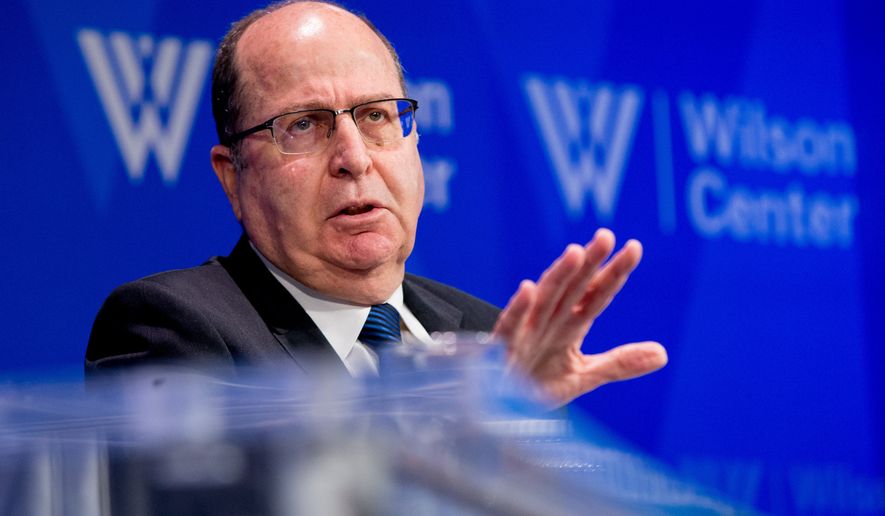Israel’s top defense official said Monday that the collapse of Syria as a functioning country is inevitable, asserting that the United Nations and the great powers need a “different grand strategy” for ending the country’s brutal five-year civil war.
The assertion by Israeli Defense Minister H.E. Moshe Ya’alon came on a day of fast-paced developments around the five-year conflict, as Russian President Vladimir Putin announced that Russia’s forces plan to begin pulling out of Syria, reversing an escalation that has bolstered the position of Moscow’s ally, Syrian President Bashar Assad.
Despite the reported pullback, Mr. Putin made clear that Russia would continue to operate its air base in Hemeimeem in Syria’s coastal province of Latakia and a naval facility in the Syrian port of Tartous.
Mr. Putin’s surprise move prompted uncertainty in both Washington and Geneva, where U.N. officials struggled Monday to breathe life into peace talks between the Assad regime and Syria’s opposition roughly two weeks after an uncertain cease-fire took hold in major parts of the war zone. A key sticking point remains the fate of Mr. Assad, whom the Obama administration and anti-government rebels still insist must step down to make way for a transition government and elections within 18 months.
On a visit to Washington, Mr. Ya’alon said Syria was already a failed state.
“There is no way to unify Syria,” the Israeli defense minister said in remarks that were something of a departure for Israel, whose leaders have largely stayed quiet on Syria over the past five years.
During an appearance at the Woodrow Wilson International Center for Scholars, he argued that the U.S. and other powers are engaged in “wishful thinking” by pursuing a strategy in which Syria remains a nation as it was before the outbreak of war in 2011.
While he offered few real specifics toward an alternative strategy, he said the only way forward is “to have a kind of federation” that includes an autonomous Kurdish “sector,” even if such is opposed by Turkey, which has been at war with its own separatist Kurdish minority for decades.
Other sectors might include an “Alawistan” led by Mr. Assad and a “Druzistan” for the nation’s Druze population, he said, suggesting that once the different sectors were established, they may be able to cooperate toward purging such Sunni Muslim extremists elements as the Islamic State and the Nusra Front.
Russian surprise
Russia’s surprise announcement, and what it meant for the conflict, were still being sorted out late Monday.
Mr. Putin said he acted because his military escalation of the past five months in Syria had “generally accomplished” its goals.
“That is why I order to start withdrawal of the main part of our military group from the territory of the Syrian Arab Republic starting from tomorrow,” Mr. Putin said during a meeting with Russian Defense Minister Sergei Shoigu and Foreign Minister Sergey Lavrov, according to the Russian government-owned news site Russia Today.
Mr. Putin said he had coordinated the withdrawal announcement with Mr. Assad, and added that the longstanding Russian air base in Latakia and naval facility in Tartous will remain in operation after the withdrawal. Mr. Putin and Mr. Obama discussed the crisis later Monday, but the White House gave few details on the conversation.
The surprise announcement left a number of questions unanswered, including the pace of the withdrawal and whether Russia’s air campaign in support of the Assad regime will also be curtailed.
Moscow’s so-called “anti-terror campaign,” which began at the end of September in the face of U.S. and Western opposition, has been credited with giving Mr. Assad’s forces a major boost against rebel factions in various areas of Syria.
U.S. and European leaders have criticized the Russian campaign, accusing Russian planes of indiscriminate bombing and of targeting only Mr. Assad’s pro-Western allies and not the Islamic State and al Qaeda forces operating inside Syria.
Syrian officials said Mr. Putin and Mr. Assad talked Monday about the plan to scale back Russian forces in Syria. In a statement issued Monday, Mr. Assad’s office said the decision reflected the “successes” the two armies have achieved in fighting terrorism in Syria and restoring peace to key areas of the country, according to The Associated Press.
Mr. Assad told Syrian state television that Russia would be drawing down its air force contingent but would not be leaving the country altogether, according to the AP report.
Iranian hegemony
In Washington, meanwhile, Mr. Ya’alon appeared to take care not to directly criticize the Obama administration despite the difficult relations between President Obama and Mr. Putin.
He pulled no punches, however, in lambasting last summer’s administration-backed nuclear accord, saying it has emboldened Iran to pursue Mideast dominance via the establishment of a “Shiite radical axis,” with major hubs from Lebanon to Syria, Iraq and Yemen.
“This axis is exploiting the deal now to gain hegemony,” he said. “For sure they are hegemonic in Tehran. In a way they are hegemonic in Baghdad through the Shiite government [there]. They are hegemonic in Beirut regarding Hezbollah, and now they are going to be hegemonic in Damascus.”
He also pointed to Iranian support for Houthi rebels presently controlling the Yemeni capital of Sa’ana, and voiced frustration over Washington’s readiness to let Iran play a major role in the talks over Syria, which borders Israel along the disputed Golan Heights.
“To leave us with an Iranian-dominated Syria — we can’t agree with it,” he said.
• David R. Sands contributed to this article, which is based in part on wire service reports.
• Guy Taylor can be reached at gtaylor@washingtontimes.com.




Please read our comment policy before commenting.